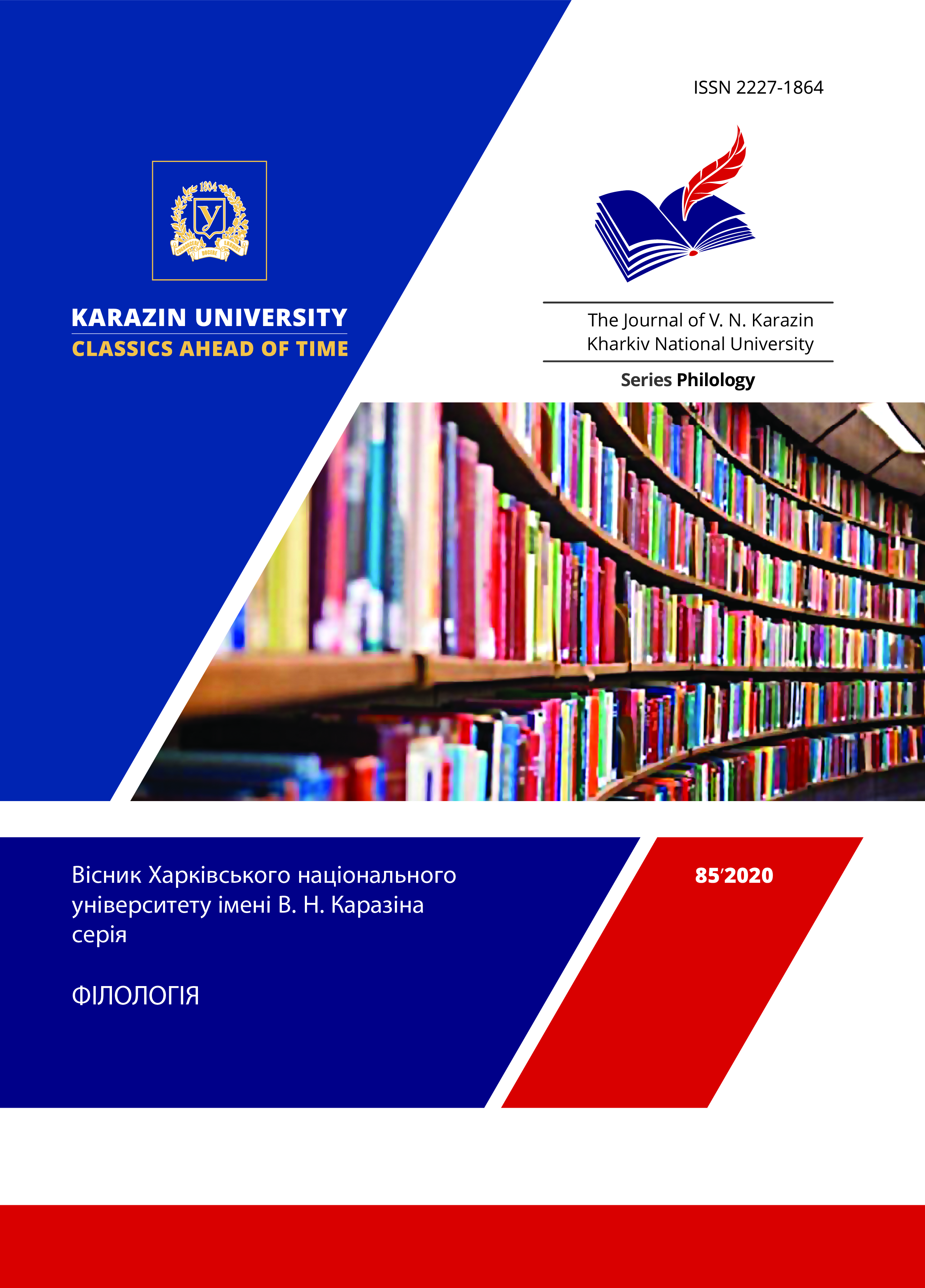Genre invariant of a conspiracy novel
Abstract
The purpose of the article is the substantiation of theoretical construct of the research – the genre invariant of the conspiracy novel. It is found that the theoretical construct has the following structure: the genre paradigm of adventure literature, which includes the conspiracy novel; the theoretical model of the genre – its invariant; the precedential text – the conspiracy novel of the "Dan Brown’s type”; the genre typology (versions of modifications).
It is proved that the “law of the genre” of the conspiracy novel as a new form of postmodern prose marks genre polyphony. The genre model of an invariant covers three plans: 1) a plan of content, 2) a plan of structure, 3) a plan of perception (according to N. Leiderman). The content plan includes invariant conspiracy motifs that are genre-forming. We consider that the dominant of the structure plan is the space-time organization, which includes the plot, the character system, and inset elements. The quest-chronotype is specific to the conspiracy novel. Its character is determined by the plot unity of search motives, the complex picture of subject-object relations, and the predicate which is a multi-level “maze”. The plot-forming constants of the conspiracy novel are a secret – a conspiracy – an investigation as a targeted search. Due to the genre marker – the secret of the conspiracy, which remains the core of the plot, the world of the novel is divided into “ours” / visible reality and “alien” / invisible reality. The quest-chronotope emerges the receptive plan of the conspiracy theological novel, namely: it helps to identify the reader with the characters, increases interest in the work, establishes a game relationship between the author and the reader, since as a result of a general search they comprehend the truth.
The precedent text of the theoretical construct is the conspiracy novel of the “Dan Brown’s type”. The descriptive model of the invariant allows us to trace genre modifications and describe the typology of the conspiracy novel in Ukrainian and American literature. The model performs both theoretical and practical functions – it contributes to the development of methodological approaches and tools for studying mass literature.
Downloads
References
Amiryan, T. N. (2012) Konspirologicheskij detektiv kak zhanr postmodernistskoj literatury: D. Brown, A. Revazov, Y. Kristeva [Conspiracy detective as a genre of postmodern literature (D. Brown, A. Revazov, Y. Kristeva]. Candidate’s thesis. Moscow [in Russian].
Bakhtin, M. M. (1986) Formy vremeni i hronotopa v romane. Ocherki po istoricheskoj pojetike [Forms of Time and Chronotope in the Novel: Essays on the Historical Poetics]. Moscow, 1986. pp. 121–290 [in Russian].
Bol'shakova A. Ju. (2003) Sovremennaya teoriya zhanra v anglo-amerikanskom literaturovedenii [Modern theories of the genre in Anglo-American literary criticism.]. Teoriya literatury. Rody i zhanry (osnovnyye problemy v istoricheskom osveshchenii) (Vols.3), (pp.99–130). Moscow [in Russian].
Brovko, O. (2012) Problema al'ternativnogo modelyuvannya istorii v literature postmodernízmu [The problem of alternative modeling of history in literature of postmodernism]. Vísn. Zaporíz. nats. un-tu. Fílologíchní nauki. Zaporízhzhya. Retrieved from: http://nbuv.gov.ua/UJRN/Vznu_fi_2012_3_6 [in Ukrainian].
Varlakova E. A. (2012) Tekstotipologicheskie harakteristiki anglojazychnogo detektiva XX veka [Text-typological characteristics of an English-language detective of the XX century]. Candidate’s thesis. Saint Petersburg [in Russian].
Gjunter H. (2008) Dominanta. [Dominant] . Dominanta. Pojetika: slovar' aktual'nyh terminov i ponjatij. - Poetics: a dictionary of relevant terms and concepts. Moscow., p. 62 [in Russian].
Kesthei, T. (1998) Anatomija detektiva :[Anatomy of a detective]. Moscow [in Russian].
Kirilenko, N. N. (2016) Zhanrovij invariant i genezis klassicheskogo detektiva [Genre invariant and genesis of the classic detective]. Candidate’s thesis. Moscow [in Russian].
Koz'mina E. Ju. (2016) Zhanrovyj podhod v izuchenii avantjurno-filosofskoj fantastiki XX v. [Genre approach in the study adventurous and philosophical fiction of the 20th century]. RSUH/RGGU Bulletin: Literaturovedenie. Yazy`koznanie. Kul`turologiya. – Literary Teory. Linguistics. Cultural Studies, 5, pp. 43–56 [in Russian].
Koz'mina E. Ju. (2017) Zhanrovye transformacii v avantjurno-filosofskoj fantastike XX veka [Genre transformations in the adventurous and philosophical fiction of the twentieth century]. Doctor’s thesis. Moscow [in Russian].
Leiderman, N. L (2010) Teorija zhanra: nauchnoe izdanie [Theory of genre: a scientific publication]. Yekaterinburg: Institut filologicheskikh issledovaniy i obrazovatel'nykh strategiy «Slovesnik». UrO RAO. Ural. gos. ped. un-t [in Russian].
Tamarchenko, N. (2008) Avantjurnaja literatura. [Adventurous literature]. Pojetika: slovar' aktual'nyh terminov i ponjatij.– Poetics: a dictionary of relevant terms and concepts (pp.8–9). Moscow [in Russian].
Tamarchenko, N. D. (2008) Invariant [Invariant] Pojetika: slovar' aktual'nyh terminov i ponjatij – Poetics: a dictionary of relevant terms and concepts (P. 79). Moscow [in Russian].
Tamarchenko, N. D. (2001) Teorija literaturnyh rodov i zhanrov. Epika [Theory of literary genera and genres. Epic] Tver' [in Russian].
Todorov,Tz. (1999) Vvedenie v fantasticheskuju literaturu [Introduction to fiction]. Moscow [in Russian].
Fílonenko, S. (2011) Masova literatura v Ukrayini: dyskurs/ gender/ zhanr [The mass literature in the Ukraine: discourse, gender, genre] monografiya. Donets'k. 432 p. [in Ukrainian].
Khlebnikov, M. (2014) Teorija zagovora. Istoriko-filosofskiy ocherk [Conspiracy Theory. Historical and philosophical essay]. Moscow. Retrieved from http://mexalib.com/ [in Russian].
Cawelti, J.G. (2014) Adventure, Mystery, and Romance: Formula Stories as Art and Popular Culture. Chicago. URL: https://books.google.ru/books?id=vnXRAgAAQBAJ&hl=ru




